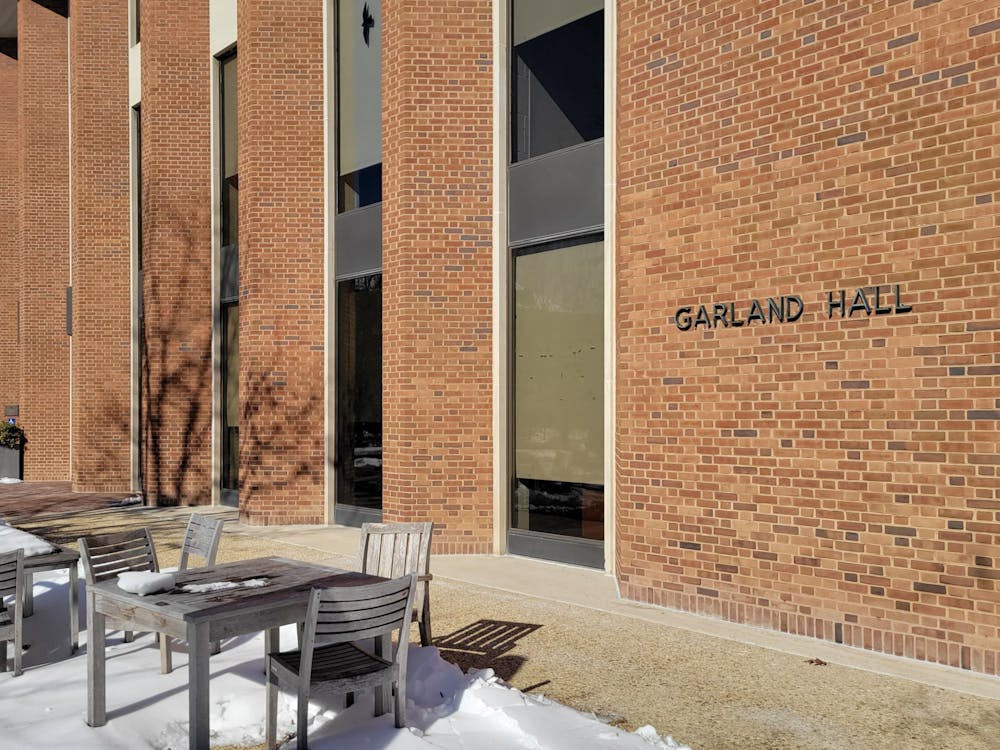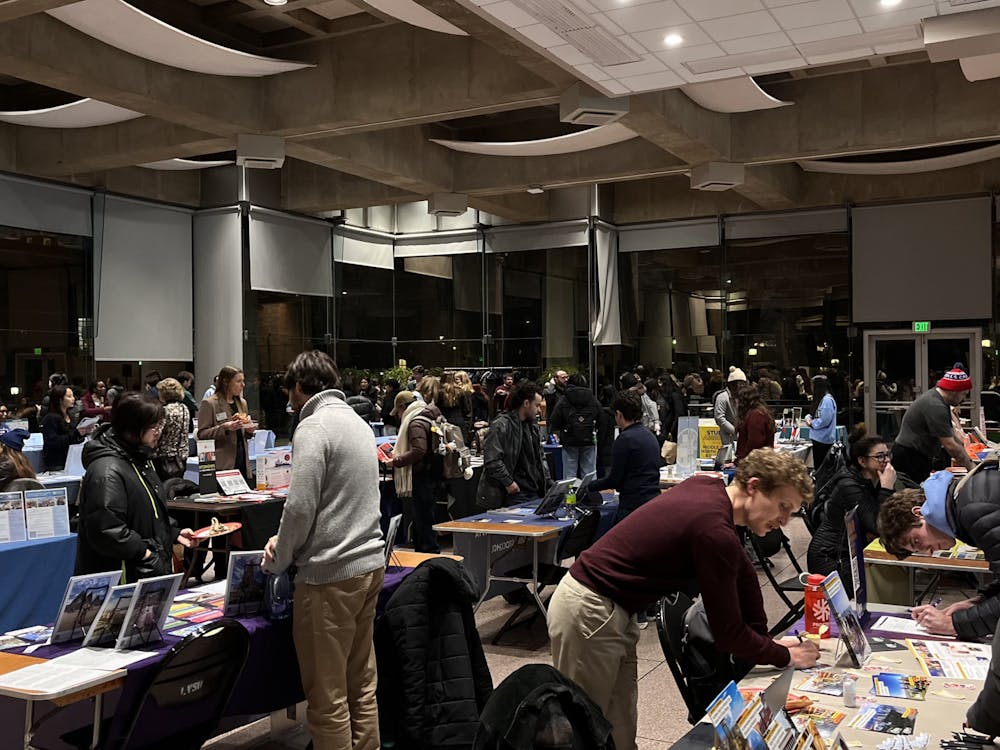An article published by The Huffington Post on Thursday evening reproached the Hopkins administration for withholding information from the University community regarding an alleged fraternity gang rape last spring.
The administration was aware that several members of the fraternity Pi Kappa Alpha (PIKE) were under investigation by Baltimore police for an alleged drug-related gang rape of a Towson University student in March of 2013; however, the Hopkins community was never publicly alerted to the incident or the inquiry, according to documents obtained by The Huffington Post.
A group of Hopkins students, who claim to have heard of the alleged gang rape several weeks after it was reported to police, filed a federal complaint to the U.S. Department of Education shortly after. The complaint accused the University of neglecting its legal obligation to alert the community of the incident and of the ensuing investigation under the Jeanne Clery Disclosure of Campus Security Policy and Campus Crime Statistics Act.
Furthermore, while the University put PIKE on social probation during the actual investigation, allegations claimed that the administration failed to act when the fraternity continued to host parties.
A statement released by the University Friday evening confirmed that they were aware of the allegation made last March but chose not to notify the community.
"The decision not to notify the university community in that case was made after considering relevant facts and legal requirements, and in consultation with the Baltimore police department, which was leading the investigation," it said.
The Baltimore Police Department fully investigated the victim's allegations before deciding to turn the case over to the State's Attorney's Office for review.
President Ronald J. Daniels has instructed the University to initiate an independent review of the matters addressed in the complaint and of the University's relevant policies and practices, to begin immediately.
"We do not at this time have specific information about the other aspects of the complaint, and have not received it, but we are aware of student concerns, and indeed were prompted by those concerns to strengthen our approach to sexual violence," the statement said.
In the complaint, the students described their larger concerns with the culture surrounding sexual violence at Hopkins.
"We are deeply concerned about the culture at JHU, as both ourselves, and several survivors, feel unable to fully disclose our names or experiences publicly for fear of retaliation," the students wrote in the complaint. "Despite this, we have filed this complaint to ensure current and future JHU students are safe on our campus."
Hopkins's statement reiterated the University's commitment to creating a safe and healthy environment for its community:
"That commitment includes protecting our students from sexual violence, offering support to victims, dealing firmly and fairly with alleged offenders, and informing students, faculty and staff of serious and ongoing threats to campus safety."
After filing the complaint, the students also questioned the Office of Student Life as to why the campus had not been informed about the alleged incident.
In an email to one student on June 5, Dean of Student Life Susan Boswell wrote that she believed the University had violated the Clery Act by neglecting to notify the community.
“I did have an initial conversation with [Director of Campus Safety and Security] Ed Skrodzki at Commencement and we are scheduled for a follow up next week,” Boswell wrote. “I expressed strong concern about how the fraternity situation had been handled and indicated that we believed there had been a Clery violation in not notifying the community.”
The Clery Act requires colleges and universities receiving federal financial assistance to publicly and accurately disclose information on crime, both on campus and in the surrounding areas. They must release timely notices of reported incidents of assault, robbery, sexual offenses, hate crimes and other crimes that could pose a serious or ongoing threat to students and employees. The law covers on-campus facilities as well as public areas and non-campus buildings such as Greek housing and athletic facilities.
Information on crime must be gathered from campus security, the local police department and “campus security authorities,” which include deans of students, resident advisors, coordinators of Greek affairs and athletic coaches.
Boswell has since taken on a new role as special adviser to the vice provost for student affairs, which will allow her to focus further on addressing issues of sexual violence and gender equity at Hopkins.
On June 27, Hopkins Title IX Coordinator Allison Boyle sent an email to several administrators raising concerns about having failed to notify the community of the PIKE incident.
"My concern is the criticism we will take for not acting (and for not already having acted) if we acknowledge that there are allegations out there,” Dennis O'Shea, executive director of communications at Hopkins, wrote in response.
Provost Robert Lieberman expressed similar concerns.
"Seems to me we will need an answer to the question of timing: why are we issuing this statement now as opposed to weeks or months ago?" he wrote.
When Boyle learned from the Baltimore Police Department that their offices were declining prosecution due to insufficient evidence, she declared that no notification email to the University community would be necessary.
Under the Clery Act, the community must be made aware of all reported crimes that fall under the categories specified, regardless of whether they have been prosecuted or an arrest has been made.
Although the U.S. Department of Education confirmed the receipt of a Clery complaint last February, a service error prevented the Office for Civil Rights from receiving the complaint until April. The office has yet to determine whether an investigation will follow.
In an email to The News-Letter Thursday, O’Shea offered the following statement on behalf of the University:
“At the Johns Hopkins University, the welfare of our community is of the utmost concern, and we are committed to ensuring a safe and healthy campus environment. We have policies and practices in place to ensure compliance with the Clery Act and to provide support and services to students who are victims of sexual violence or other crimes. We provide public notice to our community of serious or ongoing threats, and we offer students confidential counseling and resources, including information about a student's option to pursue either or both criminal prosecution or internal disciplinary action. We also continuously review and reflect upon the effectiveness of our efforts to address sexual violence, and recently established a Sexual Violence Working Group comprising faculty, students and staff to examine current efforts and recommend new initiatives to counter sexual violence.”
Director of Media Relations at Towson University Gay Pinder also expressed concern.
“We’re always concerned with any sexual assault that happens to any student. That this happened at all is tragic,” she said. “We encourage students to report these crimes to the proper authorities, depending on where the incident happened.”
Students were shocked and appalled by the Hopkins administration’s response to the situation.
“I was infuriated that the University would not let us know and would blatantly violate our rights like that,” sophomore Carlene Partow, current treasurer and president-elect of the Hopkins Feminists, said.
Partow, along with fellow member of the Hopkins Feminists junior Eliza Schultz, started a petition last month to amend the University’s sexual violence policy. Schultz agreed with Partow about the way in which Hopkins has handled the situation thus far.
“The fact is that the University, by not disclosing [this] to the [community], is essentially saying this doesn’t happen here, and that sends a much worse message to students, an awful message to victims and a very alarming message to perpetrators,” Schultz said. “They’re saying if no one finds out about this then we can get away with it.”
Schultz emphasized that the administration had information to disclose to the community regarding the incident.
“Even if it wasn’t in the form of a security warning, there was information that PIKE may not have been a safe environment,” she said. “It is important for people to know. Just think if something similar were to happen a few months later, and the University had prior knowledge, doesn’t that strike you as negligence? Maybe.”
Partow agreed.
“I think that this is something that the University has a responsibility to do,” she said. “They knew that [PIKE] was very dangerous and put their students at risk and still allowed [PIKE] to operate. I think that that is absurd and honestly not acceptable.”
Schultz reported that in her three years at Hopkins she has only received one email notification about a sexual assault.
“That was my freshman year,” Schultz said. “I know that that was really not the only incidence of sexual violence on campus. I think this is a systemic practice; this is not just one isolated incident, just given the silence from the administration in general. And I’m not saying this about PIKE. I’m saying this in general. There is a culture of silence.”
“I honestly think it’s genuinely shocking that we get an email every single time someone’s laptop is stolen, but if someone gets gang raped, we don’t get an email,” Partow added. “You would think that [the administration] would care about this.”
The Sexual Assault Resource Unit (SARU), a support system for victims and those secondarily affected, agreed with the seriousness of this issue.
"We hope the university will take such reports seriously and take this as an opportunity to improve its current methods of dealing with assault," they said in a statement.
Executive Vice President and President-Elect of the Student Government Association (SGA) Janice Bonsu, expressed her dismay in an email to The News-Letter.
“I think this speaks to the national trend that is encouraging universities to take a more active role in examining their sexual violence policies,” she wrote. “This is not just a Hopkins issue. This is a national issue, and with this kind of attention, pressure and interest changes will be made.”
Members of SGA will attend a meeting with University officials and the Sexual Violence Working Group tomorrow afternoon.
“It is my hope that in [the] meeting tomorrow with the Provost we can discuss this and other issues and really find out the best way to serve the student body,” Bonsu wrote.
An anonymous member of SGA with knowledge of the situation also spoke to The News-Letter.
“SGA knows that there is much discontent in the student body with the University’s response to many of the alleged sexual assault cases. We’re working with the University as to best go forward. There’s a meeting with SGA and other various involved people about sexual assault policy on Friday.”
Senior Mats Dreyer organized a Facebook event tonight called “Transparency Protest,” a peaceful protest that calls for greater candor from the University with respect to issues of sexual violence. The event will take place tomorrow at 12 p.m. on the Breezeway.
“You never see anything about sexual assault on this incidence report, but you hear about it,” Dreyer said. “[The protest] is to let the administration know that we want transparency, that we are aware, that we’re not just sitting around and that we actually care about the issue. We want a way for people to be able to express if they are uncomfortable.”
The News-Letter spoke to junior Luke Jenusaitus, president of the Hopkins chapter of PIKE, who declined to comment on the situation.
This past January, less than a year after the alleged gang rape, an unidentified assailant stabbed a PIKE brother in the basement of the house, putting the fraternity again under investigation and social probation.
Boswell, Lieberman, Boyle, Skrodzki and several other University officials could not be reached for comment. Additionally, national representatives for PIKE could not be reached for comment.
Jack Bartholet, Julia DeVarti, Emily Herman, Jane Jeffery and Melanie Levine contributed reporting.
SARU's 24/7 hotline number is (410) 516-7887.




